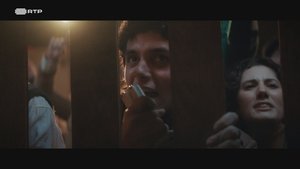
Marked by the death of a friend at the hands of PIDE, Teotónio, Rodolfo and Juliana are three students thrown onto the streets of Lisbon during the freedom celebration. In the last stronghold of the regime, the headquarters of the political police, Teotónio finds himself confronted with his greatest fear: the person responsible for the death of his friend Tomé.

César is a singer-songwriter exiled in Paris and one of the most celebrated amongst the opposition to the regime. The echoes of the failed Caldas Uprising make him decide to take a dangerous journey back home. He arrives on the eve of April 25th and immediately falls in love with São José, a revolutionary, leaving behind Maria, his girlfriend with whom he comes from Paris.

Armínio is a 30-year-old national guard stationed in the Carmo Barracks. Late on the night of the 24th to the 25th he receives a telegram with the news that his brother died in combat in Guinea. Prevented from leaving the barracks to mourn his brother's death with his mother, Armínio does everything he can to gain his freedom.

Positioned as snipers at the beginning of the siege of the Carmo Barracks, a white soldier and another black soldier are surprised by an old woman who, from the second floor balcony, invites “the boy to come up here, I have tea and cakes”. In the fight for freedom, there are still some who are freer than others.

Manuel, 19 years old, an intern at Rádio Clube Português, is being given a moralistic sermon by an old editor who is clearly attached to the regime. That night, demoralized, he listens to a phone call between his mother and his father, a soldier stationed in Santarém. Manuel waits for his mother and eight-year-old brother to fall asleep and starts practicing the perfect reporting take.